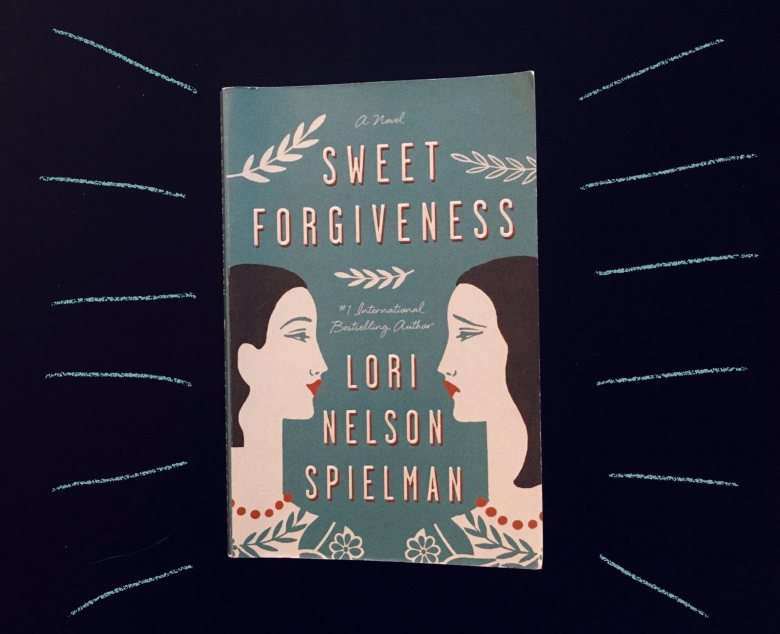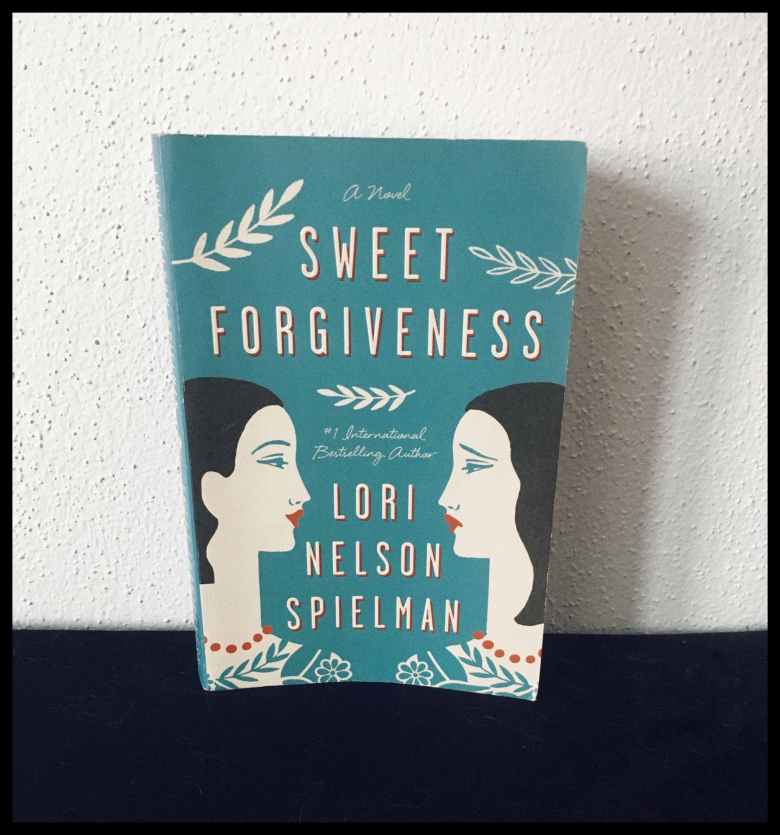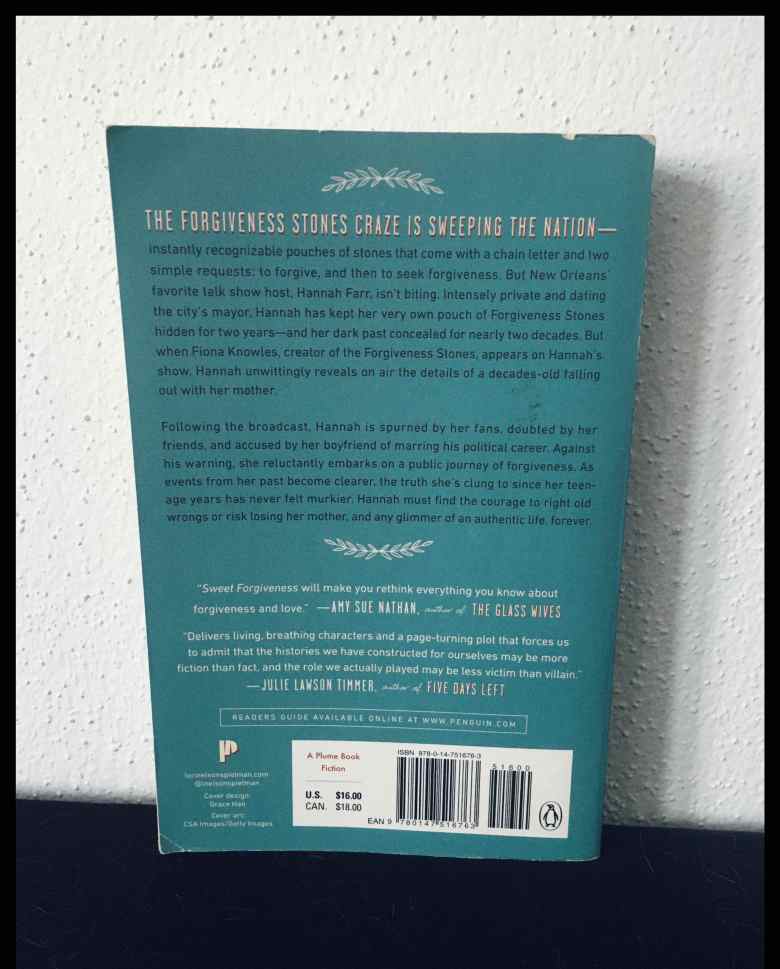
As I’ve already stated several times before, I’m a cover whore. Most often, this leads to interesting books I wouldn’t necessarily read. Sometimes, this leads to me discovering that the beautiful cover is indeed the only remarkable feature of a book. “Don’t judge a book by its cover” goes both ways I’m afraid.
Unfortunately, Spielman’s book belongs to the last category. Contrary to The Bookish Life of Nina Hill this is 100 % chick lit territory, and not in a good way. I don’t mind chick lit itself, as long as it also contains a bit of ‘lit’ and not just ‘chick.’ As long as it’s funny, entertaining, and inspiring. As long as it doesn’t try to handle sensitive issues in the worst way possible.
Allow me to elaborate.
WARNING: This review contains spoilers — it’s pretty much full of it.
Sweet Forgiveness — more than just a title
Buying this book, I’d never heard of the author before, so after reading it I wanted to find out if this is a rookie issue or just me disliking a book. Doing so I found out Spielman already had one successful book under her belt, and a third one coming our way in November 2020. Sweet Forgiveness is her second book as a “#1 international bestselling author.” I’m surprised it hasn’t been turned into a movie starring Reese ‘Do you know who I am’ Witherspoon yet. She would be perfect playing Hannah.
Anyway, it’s obviously not a rookie issue, so it’s got to be me…
So what’s this book about?
In a nutshell, Sweet Forgiveness is a future Stepford wife’s drama-o-rama.
Hannah Farr, a successful talk show host in her late 20ies/nearly 30ies, has one goal: getting her boyfriend, New Orleans mayor Michael Payne, to propose. Michael, a widower and single dad to teenager Abby, of course, has no intention of doing so. Being a widowed single dad benefits him regarding his political ambitions. Alas, that is something Hannah doesn’t realize or refuses to see throughout their relationship and a good part of the book.
So far, this is just the usual setup for a chick lit story in which the main character has to let go of her idea of true love to actually find true love. Nothing new here and it’s my fault I had to work with such a storyline since I bought this book because of its cover (and kept reading it …).
Wanting to teach Michael a lesson and show him she has a mind and a career of her own — she remembered that for a change — she applies for a job with a bigger TV station in the Chicago area. Doing so, Hannah goes all out to impress the TV executives. She pitches an interview with ‘Forgiveness Stones’ creator Fiona Knowles. Going one step further, she proposes a Forgiveness-Stone-themed reconciliation with her estranged mother on live TV. Chicago producers are thrilled and want to work with her.
Yay, Hannah’s on the road to success. Unfortunately, you guessed right, it’s not the sort of success she longs for (helloooo chick lit cliche). But fear not. The usual suspects — an evil colleague, cocky boss, and an egomaniac, soon-to-be ex-boyfriend — add a plethora of complications and schemes for Hannah to trip and fall and readjust her perspective.
Always in the background is Fiona Knowles and her Forgiveness Stones. Forgiveness Stones are a sort of chain letter with two stones inside:
One stone signifies the weight of anger.
The other stone symbolizes the weight of shame.
Both can be lifted, if you choose to rid yourself of their burdens.
Thanks to this concept (which to me sounds totally bonkers), Fiona is extremely popular and a hot commodity on TV. She also went to school with Hannah and bullied her, so they share a difficult past. Therefore, Hannah wants to do an interview with her… You guessed right, it’s Forgiveness stone alarm!
Forgive (!) me for only providing a brief and incomplete summary of a long and unnecessarily complicated plot that is, at best nice, to read but nothing more. In the end, Hannah finds love (of course), reconciles with her mother (of course), and even though the new guy hasn’t popped THE question yet, we can rest assured he will do so eventually, because hey, it’s true love!

Let’s meet some people …
Sweet Forgiveness is a rom-com, so we have several characters following a certain scheme. This is nothing bad in itself,as every genre has its usual cast.
I already described Hannah, but let’s give her the chance — as the first-person narrator of this book — to describe herself (regarding her job as a TV talk show host):
But getting made up requires that I arrive unmade, which for me is akin to trying on bathing suits under fluorescent lights with a spectator present. I used to apologize to Jade for having to witness the potholes, otherwise known as pores, on my nose, or the under-eye circles that make me look like I’m ready to play football. […] As my father used to say, if God wanted a woman’s face to be naked, he wouldn’t have created mascara.
THIS, in a nutshell, is Hannah. This is also the point at which the author lost me: page 3. There are two main reasons that I proceeded to read Sweet Forgiveness: one is that I sincerely hoped it would get better; the second is that I absolutely hate having DNFs around, especially ones I brought with me on vacation. So I carried on. 🙄
Characters like Jade — Hannah’s best friend and make-up artist — and Dorothy, another one of Hannah’s friends and the mother of her former boyfriend, enhance the story quite a bit. Jade supports Hannah through every situation and repeatedly tries to shove her in the right direction regarding her love life. Apparently, she’s also a freshly separated single mother of a 12-year-old, though the kid is hardly ever mentioned throughout the story. Maybe she’s the token single mother of the story. Dorothy is the quirky old lady, a Southern Belle (as far as I got it), who serves as a sort of surrogate mother to Hannah.
Michael, Mr. Asshole-Boyfriend-Who-Will-Not-Propose, is another cliche. Prioritizing his political career above all else, he’s obviously less serious about their relationship than Hannah. His daughter, Abby, is a typical evil stepdaughter who doesn’t accept Hannah and wants to have her father to herself (though this is not necessarily true, as we find out in the end). Talking about the ‘bad’ guys and gals, we should also not forget the evil co-worker trope: Claudia wants Hannah’s job, and she will do anything to get it.
Last but not least, there’s the true love part of the cast. On the one side, we have Jack, Hannah’s former boyfriend, and Dorothy’s son, who accuses Hannah of never really opening up to him, boycotting their relationship from the start. Then there’s RJ, Mr. True Love, who is just too good to be true and nearly gets away because of an unfortunate plot twist I still don’t really get. But by then I’ve long stopped caring about missing a point.
This is the main cast of Hannah’s world, and while there’s more going on, I won’t bother mentioning this here. If you’re interested in the book, find out for yourself. And if you do so, come back and tell me what you think of it! 🤓
Finally, let’s take a look at what didn’t work for me.

Are you serious?
This part of the review gives away a huge part of the story, but I have to tell you so that I can explain one of the main issues I had with Sweet Forgiveness.
Back when she was 13, Hannah had a falling out with her mother and stepfather Bob because she accused Bob of touching her inappropriately. Being a daddy’s girl, her father used the situation to his advantage, and she cut ties with her mother to never see her again. Until now.
What makes this part of the story so difficult and outrageous isn’t the fact that Spielman includes a sensitive but also important topic in a lighthearted rom-com. It is because the way she handles it is less than great, helpful, or even elegant.
13-year-old Hannah accuses Bob of touching her. 16 years later, she isn’t so sure anymore what actually happened. Getting carried away with the Forgiveness Stone craze, she decides to meet her mom and Bob to find closure and forgiveness. Finding them living in modest circumstances, with Bob suffering from Alzheimer’s, Hannah feels even more sorry for apparently ruining their lives with her accusations. She decides that she probably misinterpreted Bob’s action and was just a touchy 13-year-old, angry at her mom for divorcing her father.
Let’s stop here for a moment.
I’ve never been in Hannah’s situation, so I don’t feel qualified to judge this behavior. Maybe one wants to forget, suppress or revisit memories, and realize that one was wrong — I truly don’t know. But I recognize a stilted plot twist that only serves the story and nothing more when I see one. Voila!
Weakening the position of a possible victim of child abuse by suggesting that she doubts her own memory and made up the story because she was a dramatic pre-teen only serves the position of perpetrators. The position of #stilltoomanymen. The ones that explain how a victim ‘got it all wrong’ because he only wanted to do good (by groping her while catching her fall or showing appreciation or whatever those sick fucks pretend to do). The ones that point out how hysterical and bitchy one is, that she wants to get back at them for something they did, presumably out of typical teenage/female instability. The ones that blame the victim for what has happened, having dressed or behaved provocatively, so she was ‘asking for it.’ And countless more asshole situations and statements I can’t think of right now.
While it’s a well-known fact that the mind (and memory) can play tricks on us, this is certainly neither the topic nor the place/book to half-heartedly introduce the issue. Especially not when only a few chapters later it turns out that Hannah was right. Her ‘hysteric’ reaction, leaving her mother and Bob to live with her father, probably prevented anything worse from happening. Pondering if she should finally tell everyone else that she was right, she eventually decides not to, because:
Fiona is right. We lie and cover up for two reasons: to protect ourselves or to protect others. Alzheimer’s rendered Bob harmless now. I no longer need protection from him. But those who love him do. I need to protect their truth.
What the actual F*ck? I understand where she’s coming from in the context of this story, BUT is this really the message the author wants to share with us? That we should protect the perpetrators because otherwise, we hurt their loved ones? That it is more important to protect the feelings of bystanders than telling the truth and helping potential victims? That the victim has no right to share her burden because doing so could hurt someone else (who was not a victim him/herself)? The more I think about it, the angrier I get…
This is an average rom-com chick lit.
IF — let me again emphasize the IF — you want to include such a sensitive topic as child abuse and molestation into the story, DO IT PROPERLY. Be willing to go all the way and don’t just use it as a vehicle to pursue an idiotic subplot about new-age Forgiveness chain letters and ‘true love.’ Our worlds and lives are so complex and complicated and issues like abuse add several layers of complexity. This deserves a more thorough treatment than just a few chapters, Forgiveness Stones, and a happy ending. Dammit.
What to take away
I am sure Lori Nelson Spielman wrote this book with the best intentions and never wanted to upset anyone. She put in much time and effort to create Hannah’s story and I do not want to take that away from her. This is a solid piece of writing, it has its highs and lows but overall it’s a nice read. As I mentioned earlier, it’s not the author’s fault that I’m not a huge chick lit fan and therefore rather critical of these books.
There are a lot of people out there who love that book (which is an achievement in itself, but I digress). Before I posted this review I went on Goodreads where it currently has 3,8 stars, with many reviewers calling it a book ‘about forgiveness.’ As one may have guessed, I disagree. This book isn’t even slightly philosophical enough to handle such a complex topic (again). Using some Hallmark card platitudes and spicing them up with young female protagonists on their quest for love and self-discovery does not make an exceptional treatise on the multitude of ways one could seek and receive forgiveness and how this serves one’s ego (either way). It makes for an entertaining book. At best. And I found it quite boring and predictable.
This is a book for people who think of chain letters as a lovely way to stay in touch. And for those who relish a beautiful book cover without caring too much about the story inside. And for those who can enjoy rom-com chick lit much more (and less critical) than I do.
Finally, I got nothing more to say …
Thanks for stopping by, take care! 🙂
